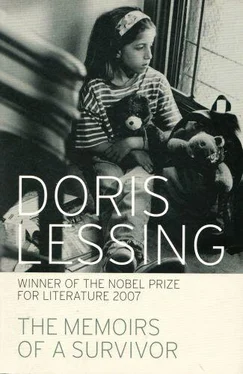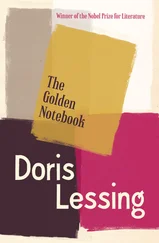That night there was a moon. There seemed more light outside my room than in it. The pavements were crammed. There was a lot of noise.
It was clear that the crowd had split into two parts: one part was about to take to the roads.
I looked for Emily with these people, but could not see her. Then I did see her: she was with the people who were staying behind. We all — I, Hugo, the part of the crowd not yet ready to make the journey, and the hundreds of people at the windows all around and above — watched as the departing ones formed up into a regiment, four or five abreast. They did not seem to be taking much with them, but summer lay ahead, and the country they were heading for was still, or so we believed, not yet much pillaged. They were mostly very young, people not yet twenty, but included a family of mother and father with three small children. A baby was carried in the arms of a friend, the mother took an infant on her back in a sling, the father had the biggest child on his shoulders. There were leaders, three men: not the middleaged or older men, but the older ones among the young people. Of these two went at the front with their women, and one came at the end with his: he had two girls attached to him. There were about forty people altogether in this band.
They had a cart or trolley, similar to the ones that had been used at airports and railway stations. This had some parcels of root vegetables and grain on it, and the little bundles of the travellers. Also, at the last moment, a couple of youths, laughing but still shamefaced or at least self-conscious, pushed on to this trolley a great limp parcel which exuded blood.
There were slim bundles of reeds on the cart — these were hawked from door to door by then; and three girls carried them as flaring torches, one at the front, one at the back, one in the middle, torches much brighter than the inadequate, when it was not altogether absent, street lighting. And off they went, along the road north-west, lit by the torches that dripped dangerous fire close above their heads. They were singing. They sang Show Me the Way to Go Home — without, or so it seemed, any consciousness of its ludicrous pathos. They sang We Shall Not be Moved, and Down by the Riverside.
They had gone, and left on the pavements were still a good many people. They seemed subdued, and soon dispersed. Emily came in, silent. She looked for Hugo — he had returned to his place along the wall, and she sat near him, and pulled his front half over her lap. She sat there hugging him, bent over him. I could see the big yellow head lying on her arm, could hear him, at last, purr and croon.
Now I knew that while she wanted more than anything to be off into that savage gamblers' future with the migrating ones, she was not prepared to sacrifice her Hugo. Or at least, was in conflict. And I dared to hope. Yet, even while I did, I wondered why I thought it mattered that she should stay. Stay with what? Me? Did I believe it mattered that she should stay where she had been left by that man? Well, my faith in that was beginning to dim: but her survival mattered, presumably, and who could say where she was likely to be safest? Did I believe that she should stay with her animal? Yes, I did; absurdly, of course, for he was only a beast. But he was hers, she loved him, she must care for him; she could not leave him without harm to herself. So I told myself, argued with myself, comforted myself — argued, too, with that invisible mentor, the man who had dropped Emily with me and gone off: how was I to know what to do? Or how to think? If I was making mistakes, then whose fault was it? He had not told me anything, or left instructions; there was no way at all of my knowing how I was expected to be living, how Emily should be living.
Behind the wall I found a room that was tall, not very large, and I think six-sided. There was no furniture in it, only a rough trestle around two of the sides. On the floor was spread a carpet, but it was a carpet without its life: it had a design, an intricate one, but the colours had an imminent existence, a potential, no more. There had been a fair or a market here, and this had left a quantity of rags, dress materials, scraps of Eastern embroideries of the kind that have tiny mirrors buttonhole — stitched into them, old clothes — everything in that line you can think of. Some people were standing about the room. At first it seemed that they were doing nothing at all; they looked idle and undecided. Then one of them detached a piece of material from the jumble on the trestles, and bent to match it with the carpet — behold, the pattern answered that part of the carpet. This piece was laid exactly on the design, and brought it to life.
It was like a child's game, giant-sized; only it was not a game, it was serious, important not only to the people actually engaged in this work, but to everyone. Then another person bent with a piece chosen from the multi-coloured heap on the trestles, bent, matched and straightened again to gaze down. There they stood, about a dozen people, quite silent, turning their eyes from the patterns of the carpet to the tangle of stuffs and back again. A recognition, the quick move, a smile of pleasure or of relief, a congratulatory glance from one of the others… there was no competition here, only the soberest and most loving co-operation. I entered the room, I stood on the carpet looking down as they did at its incompleteness, pattern without colour, except where the pieces had already been laid in a match, so that parts of the carpet had a bleak gleam, like one that has been bleached, and other parts glowed up, fulfilled, perfect. I, too, sought for fragments of materials that could bring life to the carpet, and did in fact find one, and bent down to match and fit, before some pressure moved me on again. I realised that everywhere around, in all the other rooms, were people who would in their turn drift in here, see this central activity, find their matching piece — would lay it down, and drift off again to other tasks. I left that tall room whose ceiling vanished upwards into dark where I thought I saw the shine of a star, a room whose lower part was in a bright light that enclosed the silent concentrated figures like stage-lighting. I left them and moved on. The room disappeared. I could not find it when I turned my head to see it again, so as to mark where it was. But I knew it was there waiting, I knew it had not disappeared, and the work in it continued, must continue, would go on always.
This time seems now to have gone on and on, yet in fact it was quite short, a matter of months. So much was happening, and every hour seemed crammed with new experience. Yet in appearance all I did was to live quietly there, in that room, with Hugo, with Emily. Inside it was all chaos… the feeling one is taken over by, at the times in one's life when everything is in change, movement, destruction — or reconstruction, but that is not always evident at the time — a feeling of helplessness, as if one were being whirled about in a dust-devil or a centrifuge.
Yet I had no alternative but to go on doing exactly what I was. Watching and waiting. Watching, for the most part, Emily… who had been a stranger, so it seemed, for years. But of course this was not so, it was anxiety for her that stretched the hours. The yellow beast, melancholy, his sorrow swallowed — I swear this was so, though he was no more than animal — in the determination to be stoic, not to show his wounds, sat quietly either at the window in a place behind the curtains where he could easily dodge back and down, or stretched along the wall, in a mourner's position, his head on his forepaws, his green eyes steady and open. He lay there hour after hour, contemplating his — thoughts. Why not? He thought, he judged, as animals can be seen to do, if observed without prejudice. I must say here, since it has to be said somewhere about Hugo, that I think the series of comments automatically evoked by this kind of statement, the ticker-tape remarks to do with 'anthropomorphism' are beside the point. Our emotional life is shared with the animals; we flatter ourselves that human emotions are so much more complicated than theirs. Perhaps the only emotion not known to a cat or a dog is — romantic love. And even then, we have to wonder. What is the emotional devotion of a dog for his master or mistress but something like that sort of love, all pining and yearning and 'give me, give me'. What was Hugo's love for Emily but that? As for our thoughts, our intellectual apparatus, our rationalisms and our logics and our deductions and so on, it can be said with absolute certainty that dogs and cats and monkeys cannot make a rocket to fly to the moon or weave artificial dress materials out of the byproducts of petroleum, but as we sit in the ruins of this variety of intelligence, it is hard to give it much value: I suppose we are under-valuing it now as we over-valued it then. It will have to find its place: I believe a pretty low place, at that.
Читать дальше
Конец ознакомительного отрывка
Купить книгу












